Comprehensive Report: Business Ethical Practices and Theories
VerifiedAdded on 2023/04/21
|9
|2166
|322
Report
AI Summary
This report examines business ethical practices, focusing on corporate social responsibility (CSR) and ethical theories. It begins by assessing both the narrow and broad views of CSR, highlighting their differences and implications for modern organizations. The report then delves into how ethical theories, including egoism, deontology, utilitarianism, virtue ethics, and care ethics, can inform ethical decision-making within businesses. The analysis emphasizes the importance of CSR in building a strong reputation and fostering sustainability, concluding that the broad view of CSR is more critical in today's business environment. The report provides examples of companies that embrace different CSR approaches and offers insights into how ethical theories can guide management in making sound and responsible decisions, ultimately impacting organizational operations and employee well-being. The report underscores the significance of ethics in maintaining a company's reputation and achieving long-term profitability.
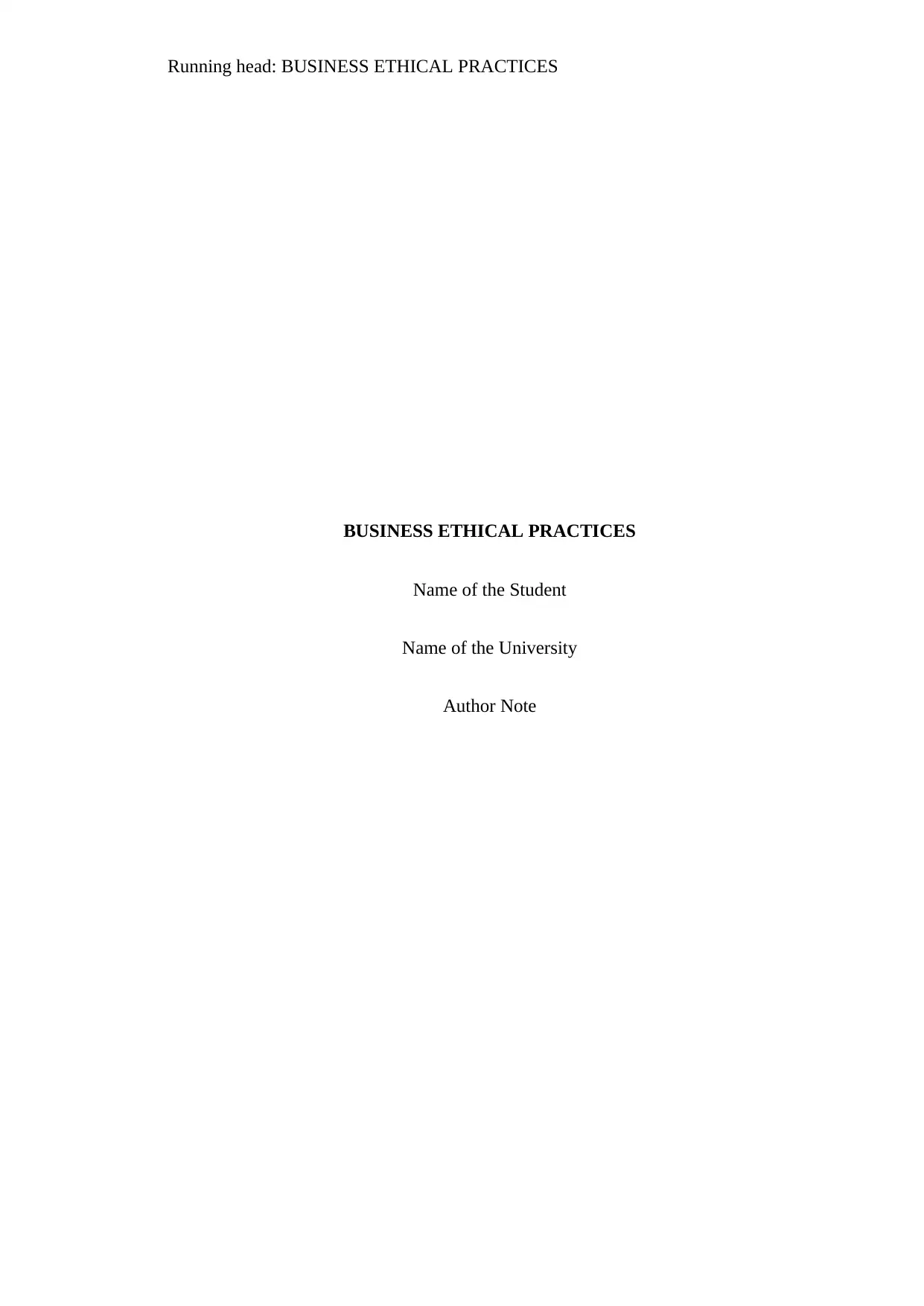
Running head: BUSINESS ETHICAL PRACTICES
BUSINESS ETHICAL PRACTICES
Name of the Student
Name of the University
Author Note
BUSINESS ETHICAL PRACTICES
Name of the Student
Name of the University
Author Note
Paraphrase This Document
Need a fresh take? Get an instant paraphrase of this document with our AI Paraphraser
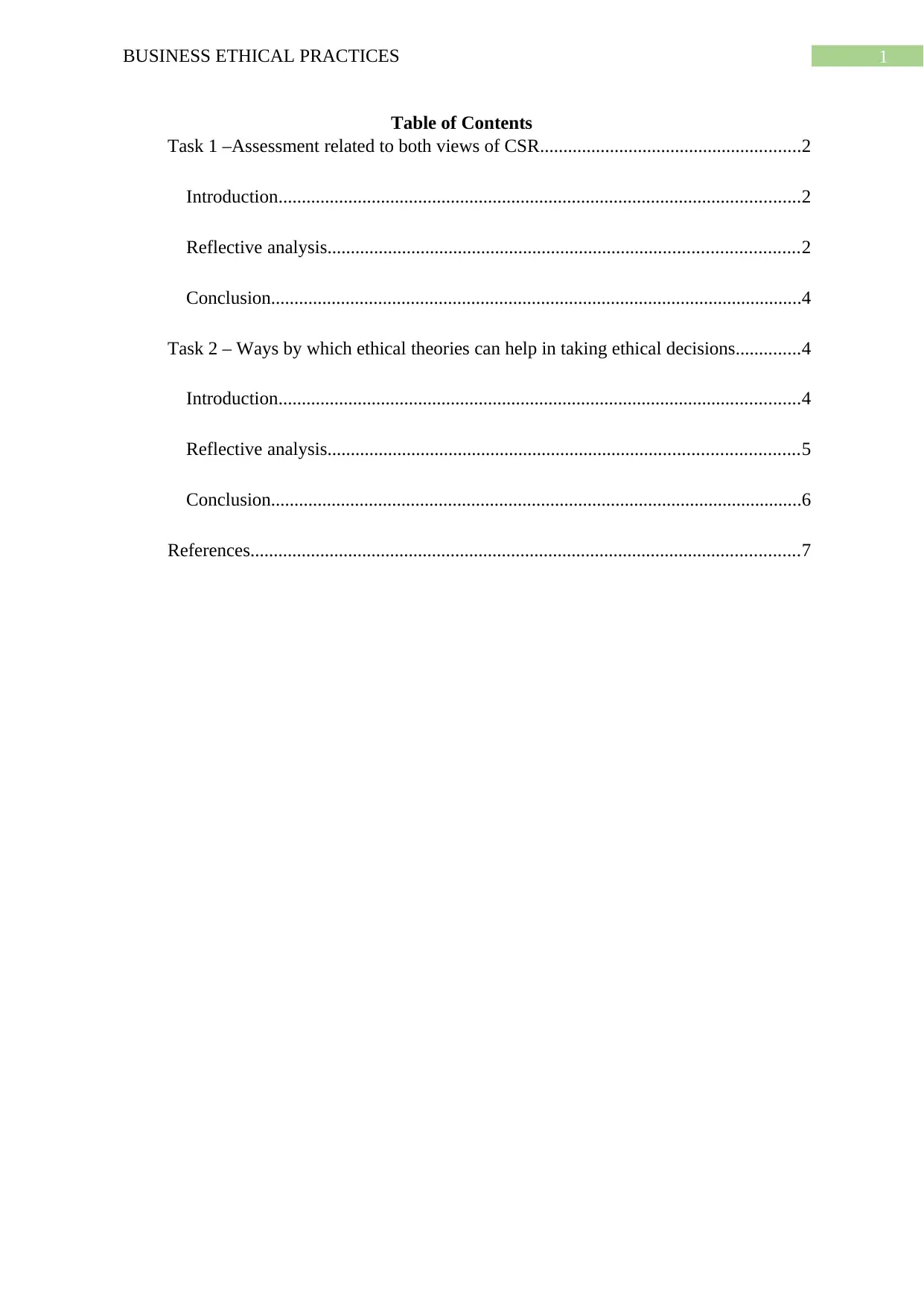
1BUSINESS ETHICAL PRACTICES
Table of Contents
Task 1 –Assessment related to both views of CSR........................................................2
Introduction................................................................................................................2
Reflective analysis.....................................................................................................2
Conclusion..................................................................................................................4
Task 2 – Ways by which ethical theories can help in taking ethical decisions..............4
Introduction................................................................................................................4
Reflective analysis.....................................................................................................5
Conclusion..................................................................................................................6
References......................................................................................................................7
Table of Contents
Task 1 –Assessment related to both views of CSR........................................................2
Introduction................................................................................................................2
Reflective analysis.....................................................................................................2
Conclusion..................................................................................................................4
Task 2 – Ways by which ethical theories can help in taking ethical decisions..............4
Introduction................................................................................................................4
Reflective analysis.....................................................................................................5
Conclusion..................................................................................................................6
References......................................................................................................................7
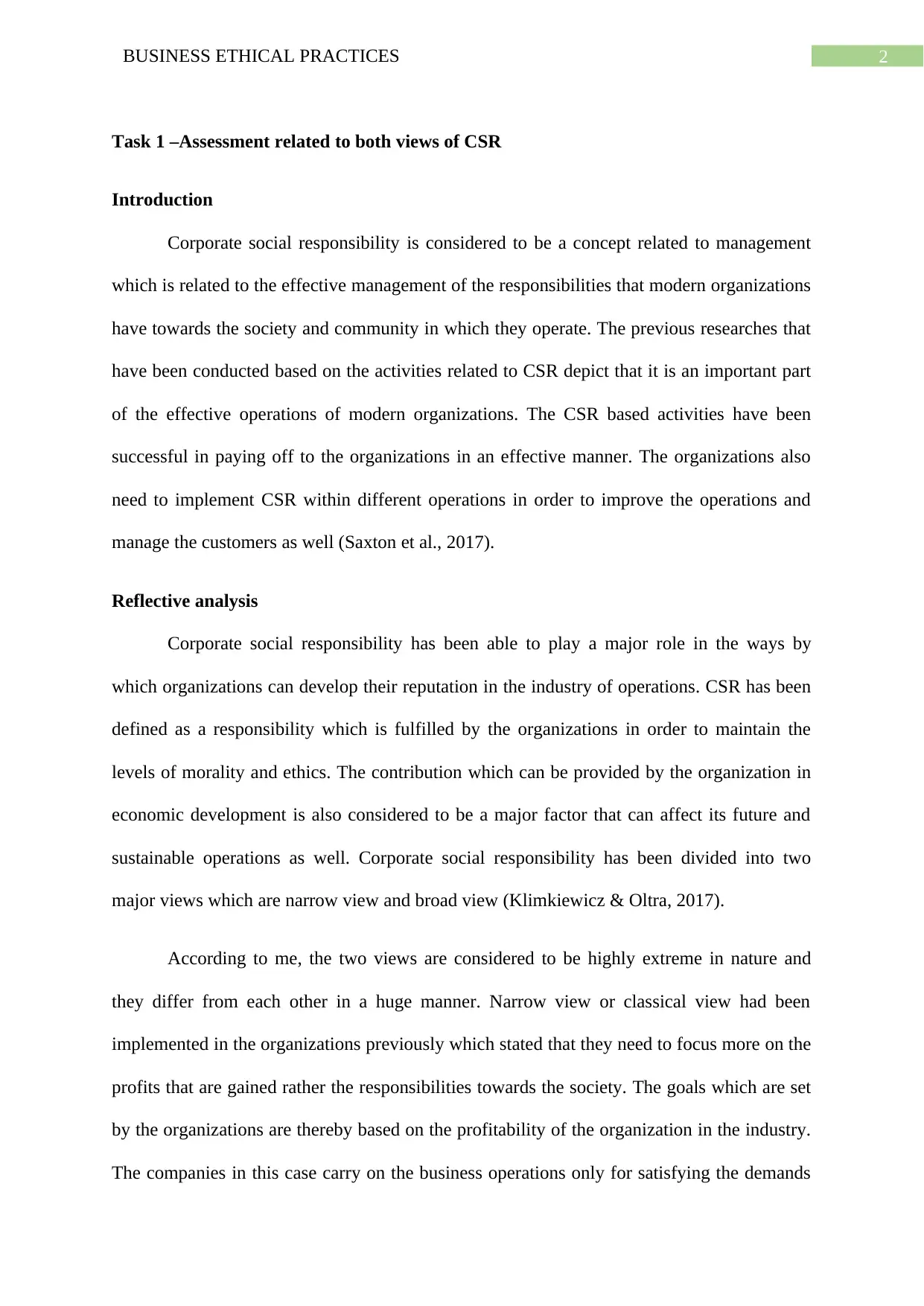
2BUSINESS ETHICAL PRACTICES
Task 1 –Assessment related to both views of CSR
Introduction
Corporate social responsibility is considered to be a concept related to management
which is related to the effective management of the responsibilities that modern organizations
have towards the society and community in which they operate. The previous researches that
have been conducted based on the activities related to CSR depict that it is an important part
of the effective operations of modern organizations. The CSR based activities have been
successful in paying off to the organizations in an effective manner. The organizations also
need to implement CSR within different operations in order to improve the operations and
manage the customers as well (Saxton et al., 2017).
Reflective analysis
Corporate social responsibility has been able to play a major role in the ways by
which organizations can develop their reputation in the industry of operations. CSR has been
defined as a responsibility which is fulfilled by the organizations in order to maintain the
levels of morality and ethics. The contribution which can be provided by the organization in
economic development is also considered to be a major factor that can affect its future and
sustainable operations as well. Corporate social responsibility has been divided into two
major views which are narrow view and broad view (Klimkiewicz & Oltra, 2017).
According to me, the two views are considered to be highly extreme in nature and
they differ from each other in a huge manner. Narrow view or classical view had been
implemented in the organizations previously which stated that they need to focus more on the
profits that are gained rather the responsibilities towards the society. The goals which are set
by the organizations are thereby based on the profitability of the organization in the industry.
The companies in this case carry on the business operations only for satisfying the demands
Task 1 –Assessment related to both views of CSR
Introduction
Corporate social responsibility is considered to be a concept related to management
which is related to the effective management of the responsibilities that modern organizations
have towards the society and community in which they operate. The previous researches that
have been conducted based on the activities related to CSR depict that it is an important part
of the effective operations of modern organizations. The CSR based activities have been
successful in paying off to the organizations in an effective manner. The organizations also
need to implement CSR within different operations in order to improve the operations and
manage the customers as well (Saxton et al., 2017).
Reflective analysis
Corporate social responsibility has been able to play a major role in the ways by
which organizations can develop their reputation in the industry of operations. CSR has been
defined as a responsibility which is fulfilled by the organizations in order to maintain the
levels of morality and ethics. The contribution which can be provided by the organization in
economic development is also considered to be a major factor that can affect its future and
sustainable operations as well. Corporate social responsibility has been divided into two
major views which are narrow view and broad view (Klimkiewicz & Oltra, 2017).
According to me, the two views are considered to be highly extreme in nature and
they differ from each other in a huge manner. Narrow view or classical view had been
implemented in the organizations previously which stated that they need to focus more on the
profits that are gained rather the responsibilities towards the society. The goals which are set
by the organizations are thereby based on the profitability of the organization in the industry.
The companies in this case carry on the business operations only for satisfying the demands
⊘ This is a preview!⊘
Do you want full access?
Subscribe today to unlock all pages.

Trusted by 1+ million students worldwide
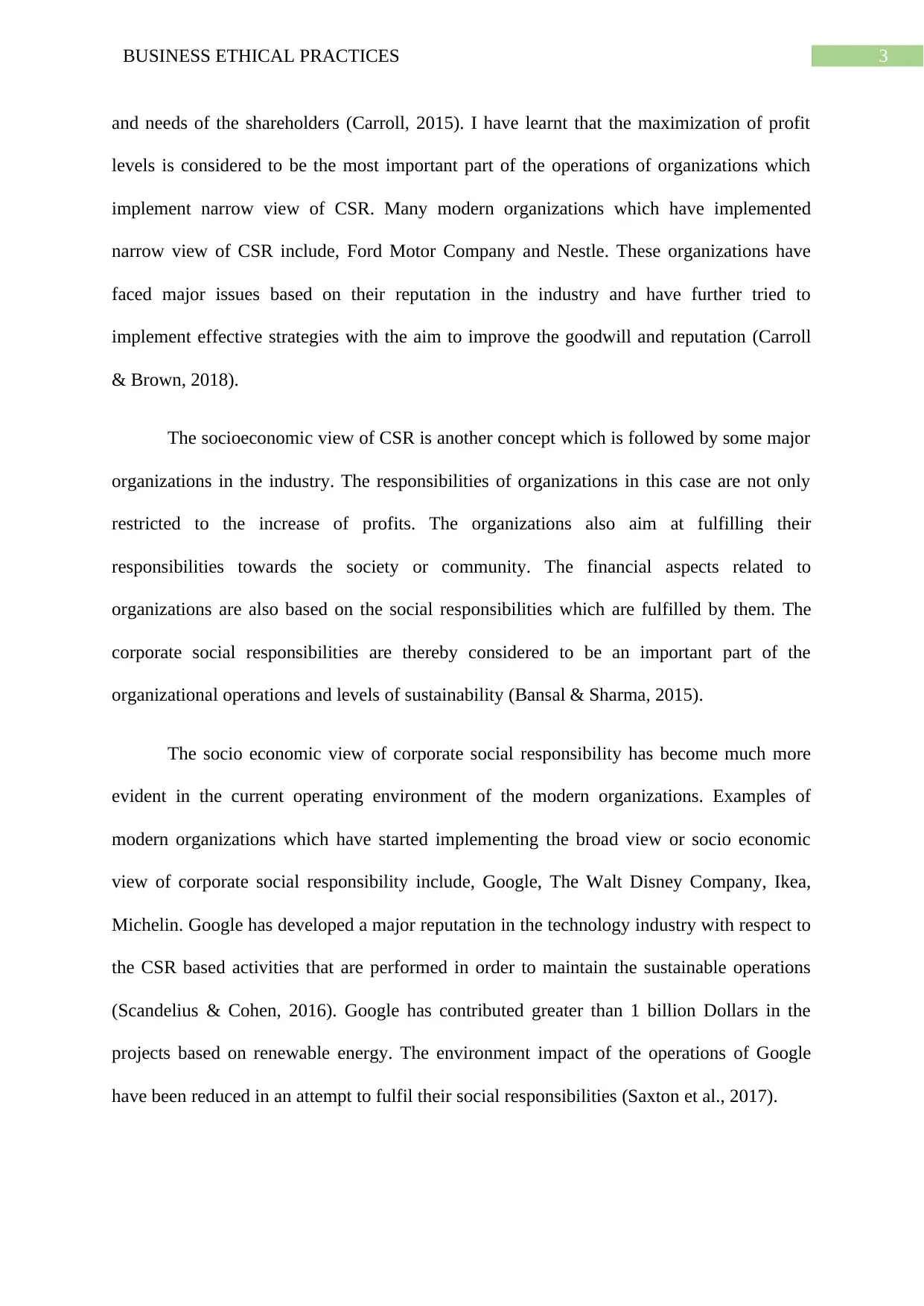
3BUSINESS ETHICAL PRACTICES
and needs of the shareholders (Carroll, 2015). I have learnt that the maximization of profit
levels is considered to be the most important part of the operations of organizations which
implement narrow view of CSR. Many modern organizations which have implemented
narrow view of CSR include, Ford Motor Company and Nestle. These organizations have
faced major issues based on their reputation in the industry and have further tried to
implement effective strategies with the aim to improve the goodwill and reputation (Carroll
& Brown, 2018).
The socioeconomic view of CSR is another concept which is followed by some major
organizations in the industry. The responsibilities of organizations in this case are not only
restricted to the increase of profits. The organizations also aim at fulfilling their
responsibilities towards the society or community. The financial aspects related to
organizations are also based on the social responsibilities which are fulfilled by them. The
corporate social responsibilities are thereby considered to be an important part of the
organizational operations and levels of sustainability (Bansal & Sharma, 2015).
The socio economic view of corporate social responsibility has become much more
evident in the current operating environment of the modern organizations. Examples of
modern organizations which have started implementing the broad view or socio economic
view of corporate social responsibility include, Google, The Walt Disney Company, Ikea,
Michelin. Google has developed a major reputation in the technology industry with respect to
the CSR based activities that are performed in order to maintain the sustainable operations
(Scandelius & Cohen, 2016). Google has contributed greater than 1 billion Dollars in the
projects based on renewable energy. The environment impact of the operations of Google
have been reduced in an attempt to fulfil their social responsibilities (Saxton et al., 2017).
and needs of the shareholders (Carroll, 2015). I have learnt that the maximization of profit
levels is considered to be the most important part of the operations of organizations which
implement narrow view of CSR. Many modern organizations which have implemented
narrow view of CSR include, Ford Motor Company and Nestle. These organizations have
faced major issues based on their reputation in the industry and have further tried to
implement effective strategies with the aim to improve the goodwill and reputation (Carroll
& Brown, 2018).
The socioeconomic view of CSR is another concept which is followed by some major
organizations in the industry. The responsibilities of organizations in this case are not only
restricted to the increase of profits. The organizations also aim at fulfilling their
responsibilities towards the society or community. The financial aspects related to
organizations are also based on the social responsibilities which are fulfilled by them. The
corporate social responsibilities are thereby considered to be an important part of the
organizational operations and levels of sustainability (Bansal & Sharma, 2015).
The socio economic view of corporate social responsibility has become much more
evident in the current operating environment of the modern organizations. Examples of
modern organizations which have started implementing the broad view or socio economic
view of corporate social responsibility include, Google, The Walt Disney Company, Ikea,
Michelin. Google has developed a major reputation in the technology industry with respect to
the CSR based activities that are performed in order to maintain the sustainable operations
(Scandelius & Cohen, 2016). Google has contributed greater than 1 billion Dollars in the
projects based on renewable energy. The environment impact of the operations of Google
have been reduced in an attempt to fulfil their social responsibilities (Saxton et al., 2017).
Paraphrase This Document
Need a fresh take? Get an instant paraphrase of this document with our AI Paraphraser
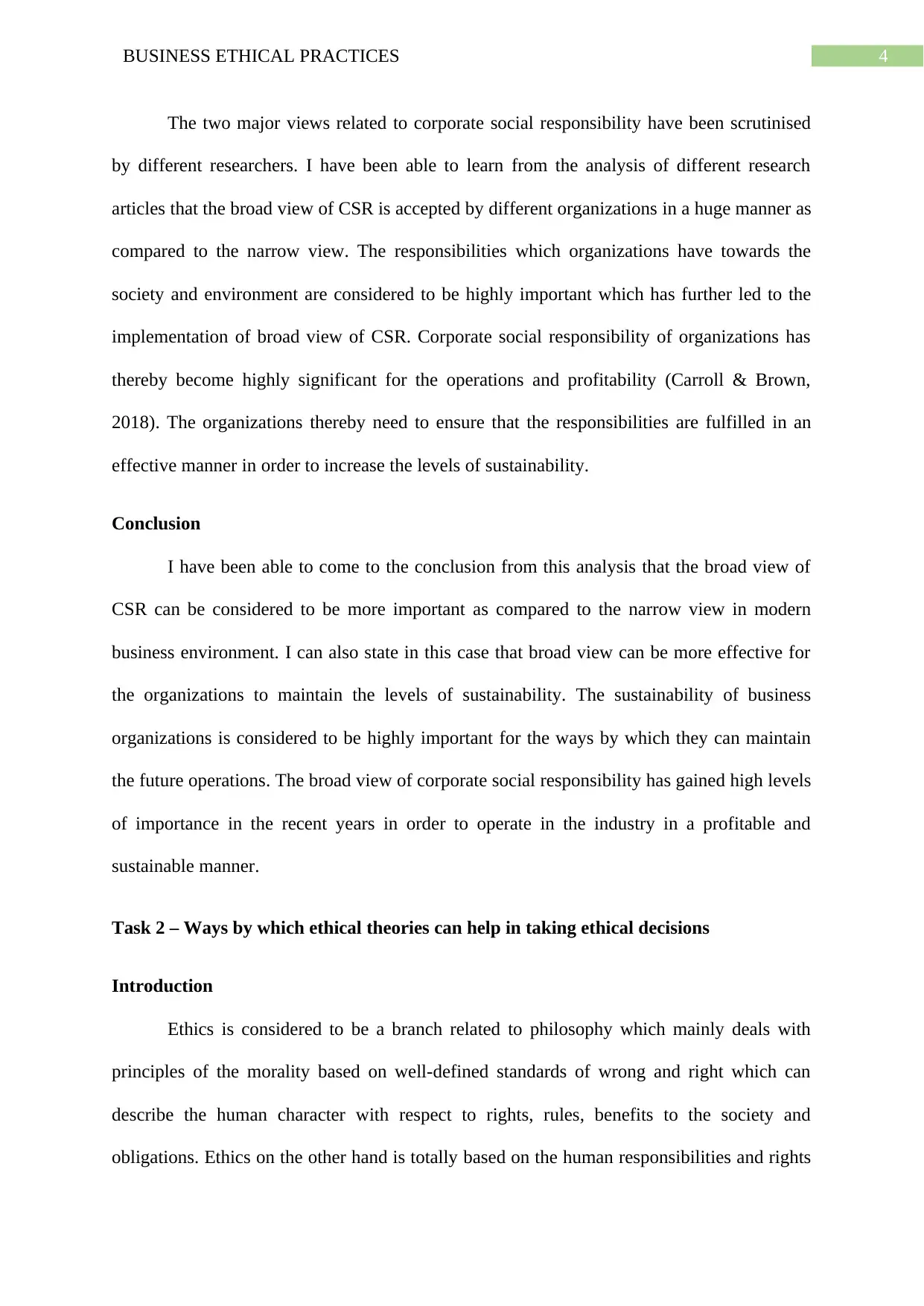
4BUSINESS ETHICAL PRACTICES
The two major views related to corporate social responsibility have been scrutinised
by different researchers. I have been able to learn from the analysis of different research
articles that the broad view of CSR is accepted by different organizations in a huge manner as
compared to the narrow view. The responsibilities which organizations have towards the
society and environment are considered to be highly important which has further led to the
implementation of broad view of CSR. Corporate social responsibility of organizations has
thereby become highly significant for the operations and profitability (Carroll & Brown,
2018). The organizations thereby need to ensure that the responsibilities are fulfilled in an
effective manner in order to increase the levels of sustainability.
Conclusion
I have been able to come to the conclusion from this analysis that the broad view of
CSR can be considered to be more important as compared to the narrow view in modern
business environment. I can also state in this case that broad view can be more effective for
the organizations to maintain the levels of sustainability. The sustainability of business
organizations is considered to be highly important for the ways by which they can maintain
the future operations. The broad view of corporate social responsibility has gained high levels
of importance in the recent years in order to operate in the industry in a profitable and
sustainable manner.
Task 2 – Ways by which ethical theories can help in taking ethical decisions
Introduction
Ethics is considered to be a branch related to philosophy which mainly deals with
principles of the morality based on well-defined standards of wrong and right which can
describe the human character with respect to rights, rules, benefits to the society and
obligations. Ethics on the other hand is totally based on the human responsibilities and rights
The two major views related to corporate social responsibility have been scrutinised
by different researchers. I have been able to learn from the analysis of different research
articles that the broad view of CSR is accepted by different organizations in a huge manner as
compared to the narrow view. The responsibilities which organizations have towards the
society and environment are considered to be highly important which has further led to the
implementation of broad view of CSR. Corporate social responsibility of organizations has
thereby become highly significant for the operations and profitability (Carroll & Brown,
2018). The organizations thereby need to ensure that the responsibilities are fulfilled in an
effective manner in order to increase the levels of sustainability.
Conclusion
I have been able to come to the conclusion from this analysis that the broad view of
CSR can be considered to be more important as compared to the narrow view in modern
business environment. I can also state in this case that broad view can be more effective for
the organizations to maintain the levels of sustainability. The sustainability of business
organizations is considered to be highly important for the ways by which they can maintain
the future operations. The broad view of corporate social responsibility has gained high levels
of importance in the recent years in order to operate in the industry in a profitable and
sustainable manner.
Task 2 – Ways by which ethical theories can help in taking ethical decisions
Introduction
Ethics is considered to be a branch related to philosophy which mainly deals with
principles of the morality based on well-defined standards of wrong and right which can
describe the human character with respect to rights, rules, benefits to the society and
obligations. Ethics on the other hand is totally based on the human responsibilities and rights
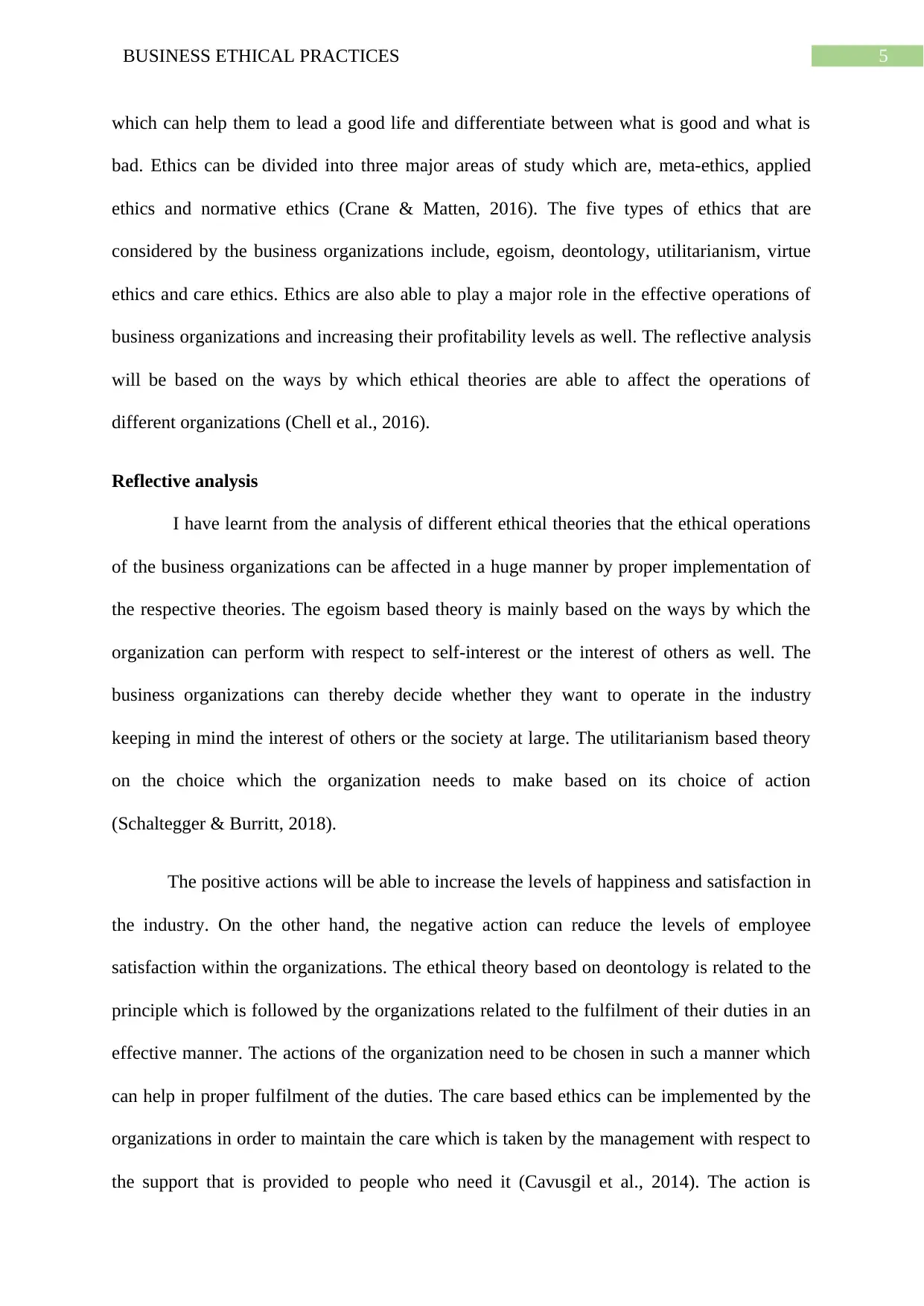
5BUSINESS ETHICAL PRACTICES
which can help them to lead a good life and differentiate between what is good and what is
bad. Ethics can be divided into three major areas of study which are, meta-ethics, applied
ethics and normative ethics (Crane & Matten, 2016). The five types of ethics that are
considered by the business organizations include, egoism, deontology, utilitarianism, virtue
ethics and care ethics. Ethics are also able to play a major role in the effective operations of
business organizations and increasing their profitability levels as well. The reflective analysis
will be based on the ways by which ethical theories are able to affect the operations of
different organizations (Chell et al., 2016).
Reflective analysis
I have learnt from the analysis of different ethical theories that the ethical operations
of the business organizations can be affected in a huge manner by proper implementation of
the respective theories. The egoism based theory is mainly based on the ways by which the
organization can perform with respect to self-interest or the interest of others as well. The
business organizations can thereby decide whether they want to operate in the industry
keeping in mind the interest of others or the society at large. The utilitarianism based theory
on the choice which the organization needs to make based on its choice of action
(Schaltegger & Burritt, 2018).
The positive actions will be able to increase the levels of happiness and satisfaction in
the industry. On the other hand, the negative action can reduce the levels of employee
satisfaction within the organizations. The ethical theory based on deontology is related to the
principle which is followed by the organizations related to the fulfilment of their duties in an
effective manner. The actions of the organization need to be chosen in such a manner which
can help in proper fulfilment of the duties. The care based ethics can be implemented by the
organizations in order to maintain the care which is taken by the management with respect to
the support that is provided to people who need it (Cavusgil et al., 2014). The action is
which can help them to lead a good life and differentiate between what is good and what is
bad. Ethics can be divided into three major areas of study which are, meta-ethics, applied
ethics and normative ethics (Crane & Matten, 2016). The five types of ethics that are
considered by the business organizations include, egoism, deontology, utilitarianism, virtue
ethics and care ethics. Ethics are also able to play a major role in the effective operations of
business organizations and increasing their profitability levels as well. The reflective analysis
will be based on the ways by which ethical theories are able to affect the operations of
different organizations (Chell et al., 2016).
Reflective analysis
I have learnt from the analysis of different ethical theories that the ethical operations
of the business organizations can be affected in a huge manner by proper implementation of
the respective theories. The egoism based theory is mainly based on the ways by which the
organization can perform with respect to self-interest or the interest of others as well. The
business organizations can thereby decide whether they want to operate in the industry
keeping in mind the interest of others or the society at large. The utilitarianism based theory
on the choice which the organization needs to make based on its choice of action
(Schaltegger & Burritt, 2018).
The positive actions will be able to increase the levels of happiness and satisfaction in
the industry. On the other hand, the negative action can reduce the levels of employee
satisfaction within the organizations. The ethical theory based on deontology is related to the
principle which is followed by the organizations related to the fulfilment of their duties in an
effective manner. The actions of the organization need to be chosen in such a manner which
can help in proper fulfilment of the duties. The care based ethics can be implemented by the
organizations in order to maintain the care which is taken by the management with respect to
the support that is provided to people who need it (Cavusgil et al., 2014). The action is
⊘ This is a preview!⊘
Do you want full access?
Subscribe today to unlock all pages.

Trusted by 1+ million students worldwide
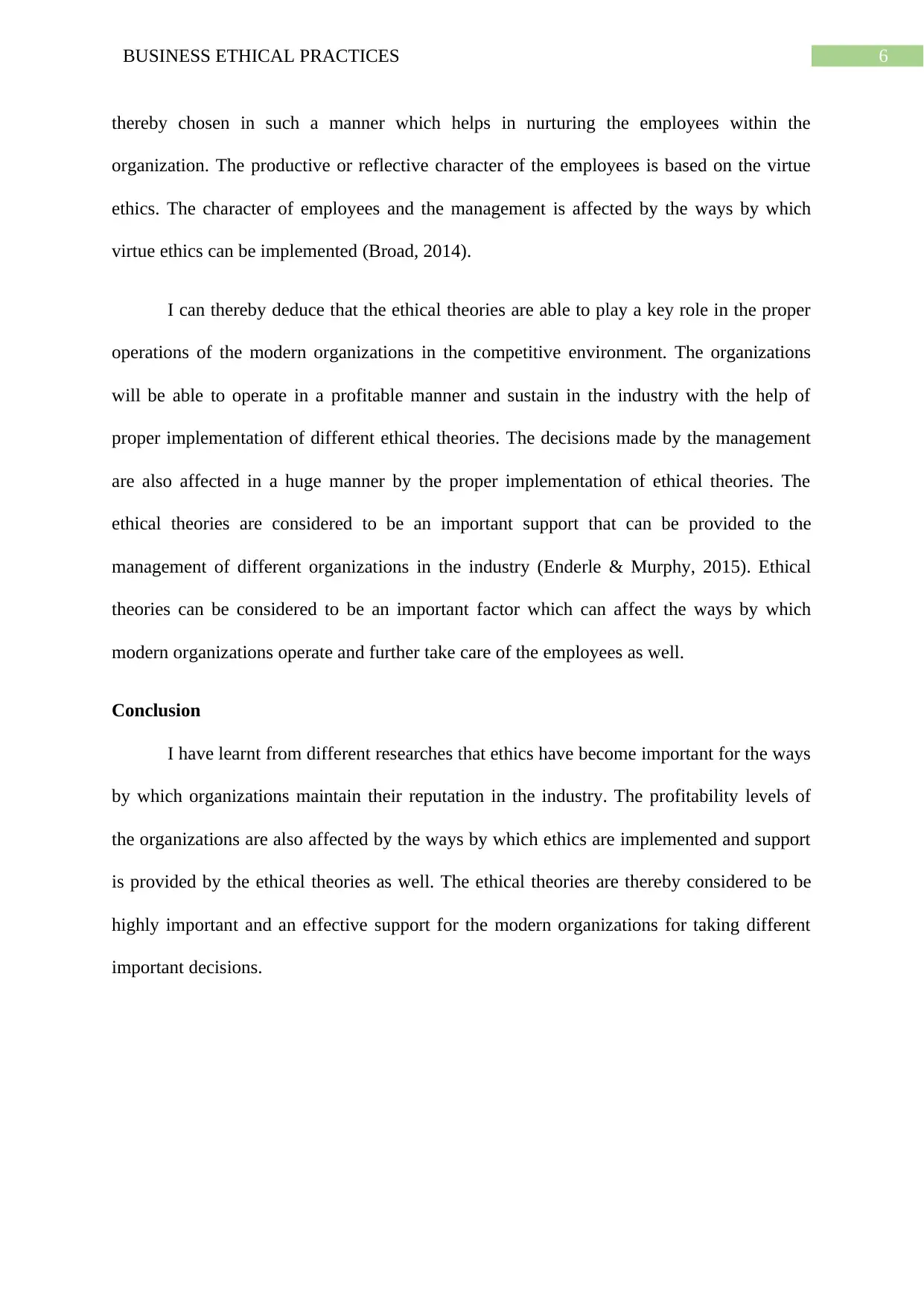
6BUSINESS ETHICAL PRACTICES
thereby chosen in such a manner which helps in nurturing the employees within the
organization. The productive or reflective character of the employees is based on the virtue
ethics. The character of employees and the management is affected by the ways by which
virtue ethics can be implemented (Broad, 2014).
I can thereby deduce that the ethical theories are able to play a key role in the proper
operations of the modern organizations in the competitive environment. The organizations
will be able to operate in a profitable manner and sustain in the industry with the help of
proper implementation of different ethical theories. The decisions made by the management
are also affected in a huge manner by the proper implementation of ethical theories. The
ethical theories are considered to be an important support that can be provided to the
management of different organizations in the industry (Enderle & Murphy, 2015). Ethical
theories can be considered to be an important factor which can affect the ways by which
modern organizations operate and further take care of the employees as well.
Conclusion
I have learnt from different researches that ethics have become important for the ways
by which organizations maintain their reputation in the industry. The profitability levels of
the organizations are also affected by the ways by which ethics are implemented and support
is provided by the ethical theories as well. The ethical theories are thereby considered to be
highly important and an effective support for the modern organizations for taking different
important decisions.
thereby chosen in such a manner which helps in nurturing the employees within the
organization. The productive or reflective character of the employees is based on the virtue
ethics. The character of employees and the management is affected by the ways by which
virtue ethics can be implemented (Broad, 2014).
I can thereby deduce that the ethical theories are able to play a key role in the proper
operations of the modern organizations in the competitive environment. The organizations
will be able to operate in a profitable manner and sustain in the industry with the help of
proper implementation of different ethical theories. The decisions made by the management
are also affected in a huge manner by the proper implementation of ethical theories. The
ethical theories are considered to be an important support that can be provided to the
management of different organizations in the industry (Enderle & Murphy, 2015). Ethical
theories can be considered to be an important factor which can affect the ways by which
modern organizations operate and further take care of the employees as well.
Conclusion
I have learnt from different researches that ethics have become important for the ways
by which organizations maintain their reputation in the industry. The profitability levels of
the organizations are also affected by the ways by which ethics are implemented and support
is provided by the ethical theories as well. The ethical theories are thereby considered to be
highly important and an effective support for the modern organizations for taking different
important decisions.
Paraphrase This Document
Need a fresh take? Get an instant paraphrase of this document with our AI Paraphraser
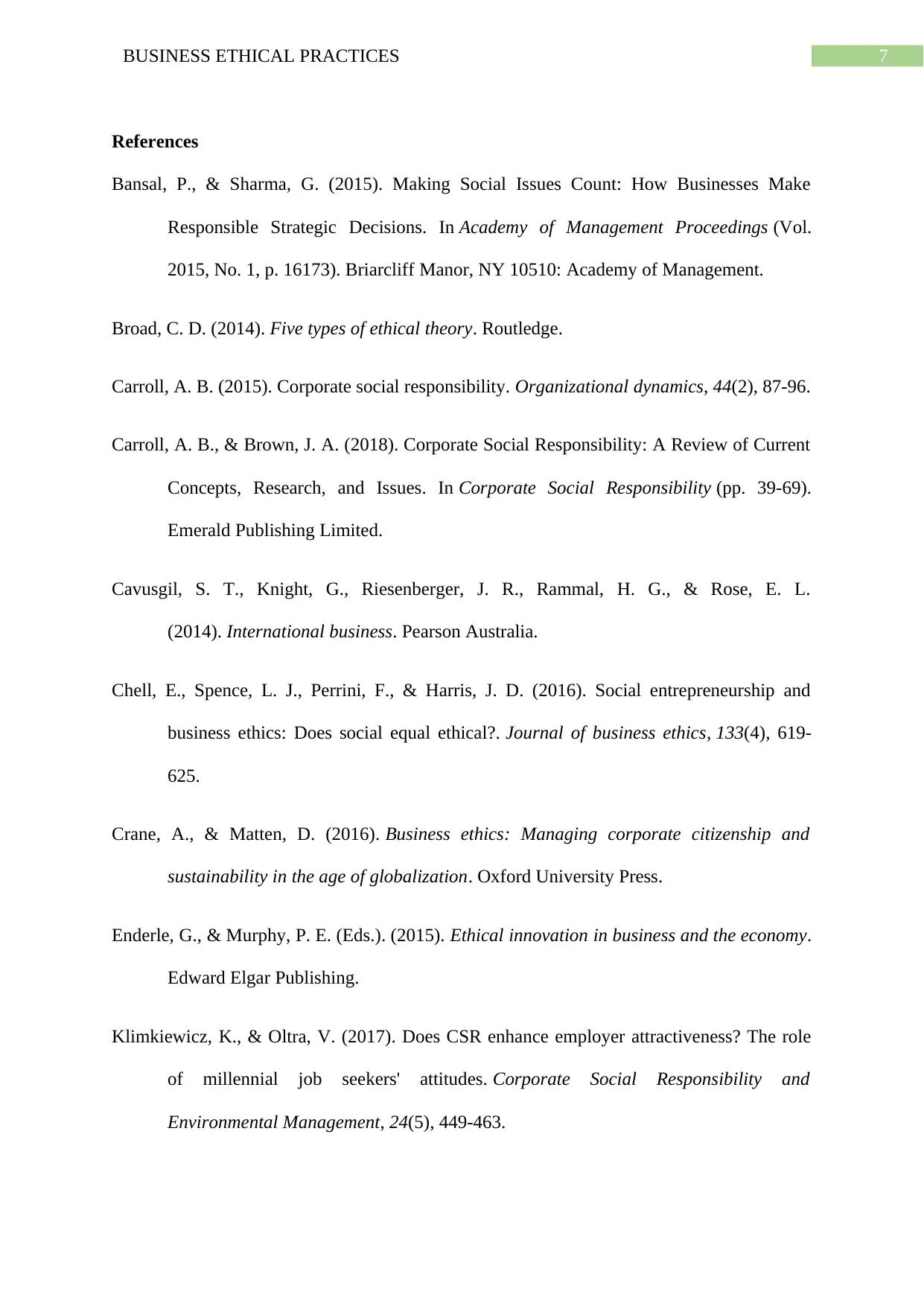
7BUSINESS ETHICAL PRACTICES
References
Bansal, P., & Sharma, G. (2015). Making Social Issues Count: How Businesses Make
Responsible Strategic Decisions. In Academy of Management Proceedings (Vol.
2015, No. 1, p. 16173). Briarcliff Manor, NY 10510: Academy of Management.
Broad, C. D. (2014). Five types of ethical theory. Routledge.
Carroll, A. B. (2015). Corporate social responsibility. Organizational dynamics, 44(2), 87-96.
Carroll, A. B., & Brown, J. A. (2018). Corporate Social Responsibility: A Review of Current
Concepts, Research, and Issues. In Corporate Social Responsibility (pp. 39-69).
Emerald Publishing Limited.
Cavusgil, S. T., Knight, G., Riesenberger, J. R., Rammal, H. G., & Rose, E. L.
(2014). International business. Pearson Australia.
Chell, E., Spence, L. J., Perrini, F., & Harris, J. D. (2016). Social entrepreneurship and
business ethics: Does social equal ethical?. Journal of business ethics, 133(4), 619-
625.
Crane, A., & Matten, D. (2016). Business ethics: Managing corporate citizenship and
sustainability in the age of globalization. Oxford University Press.
Enderle, G., & Murphy, P. E. (Eds.). (2015). Ethical innovation in business and the economy.
Edward Elgar Publishing.
Klimkiewicz, K., & Oltra, V. (2017). Does CSR enhance employer attractiveness? The role
of millennial job seekers' attitudes. Corporate Social Responsibility and
Environmental Management, 24(5), 449-463.
References
Bansal, P., & Sharma, G. (2015). Making Social Issues Count: How Businesses Make
Responsible Strategic Decisions. In Academy of Management Proceedings (Vol.
2015, No. 1, p. 16173). Briarcliff Manor, NY 10510: Academy of Management.
Broad, C. D. (2014). Five types of ethical theory. Routledge.
Carroll, A. B. (2015). Corporate social responsibility. Organizational dynamics, 44(2), 87-96.
Carroll, A. B., & Brown, J. A. (2018). Corporate Social Responsibility: A Review of Current
Concepts, Research, and Issues. In Corporate Social Responsibility (pp. 39-69).
Emerald Publishing Limited.
Cavusgil, S. T., Knight, G., Riesenberger, J. R., Rammal, H. G., & Rose, E. L.
(2014). International business. Pearson Australia.
Chell, E., Spence, L. J., Perrini, F., & Harris, J. D. (2016). Social entrepreneurship and
business ethics: Does social equal ethical?. Journal of business ethics, 133(4), 619-
625.
Crane, A., & Matten, D. (2016). Business ethics: Managing corporate citizenship and
sustainability in the age of globalization. Oxford University Press.
Enderle, G., & Murphy, P. E. (Eds.). (2015). Ethical innovation in business and the economy.
Edward Elgar Publishing.
Klimkiewicz, K., & Oltra, V. (2017). Does CSR enhance employer attractiveness? The role
of millennial job seekers' attitudes. Corporate Social Responsibility and
Environmental Management, 24(5), 449-463.
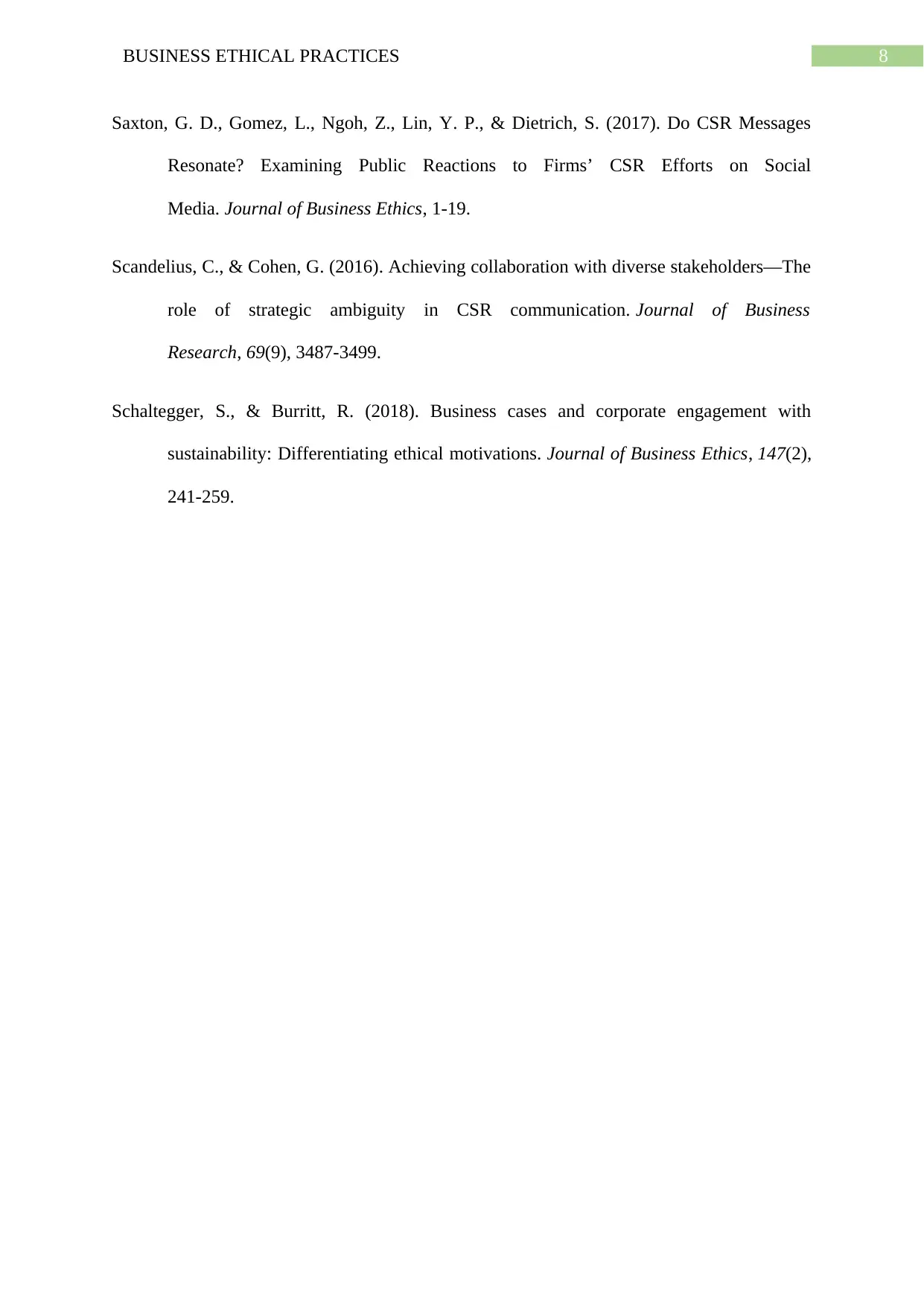
8BUSINESS ETHICAL PRACTICES
Saxton, G. D., Gomez, L., Ngoh, Z., Lin, Y. P., & Dietrich, S. (2017). Do CSR Messages
Resonate? Examining Public Reactions to Firms’ CSR Efforts on Social
Media. Journal of Business Ethics, 1-19.
Scandelius, C., & Cohen, G. (2016). Achieving collaboration with diverse stakeholders—The
role of strategic ambiguity in CSR communication. Journal of Business
Research, 69(9), 3487-3499.
Schaltegger, S., & Burritt, R. (2018). Business cases and corporate engagement with
sustainability: Differentiating ethical motivations. Journal of Business Ethics, 147(2),
241-259.
Saxton, G. D., Gomez, L., Ngoh, Z., Lin, Y. P., & Dietrich, S. (2017). Do CSR Messages
Resonate? Examining Public Reactions to Firms’ CSR Efforts on Social
Media. Journal of Business Ethics, 1-19.
Scandelius, C., & Cohen, G. (2016). Achieving collaboration with diverse stakeholders—The
role of strategic ambiguity in CSR communication. Journal of Business
Research, 69(9), 3487-3499.
Schaltegger, S., & Burritt, R. (2018). Business cases and corporate engagement with
sustainability: Differentiating ethical motivations. Journal of Business Ethics, 147(2),
241-259.
⊘ This is a preview!⊘
Do you want full access?
Subscribe today to unlock all pages.

Trusted by 1+ million students worldwide
1 out of 9
Related Documents
Your All-in-One AI-Powered Toolkit for Academic Success.
+13062052269
info@desklib.com
Available 24*7 on WhatsApp / Email
![[object Object]](/_next/static/media/star-bottom.7253800d.svg)
Unlock your academic potential
Copyright © 2020–2026 A2Z Services. All Rights Reserved. Developed and managed by ZUCOL.





